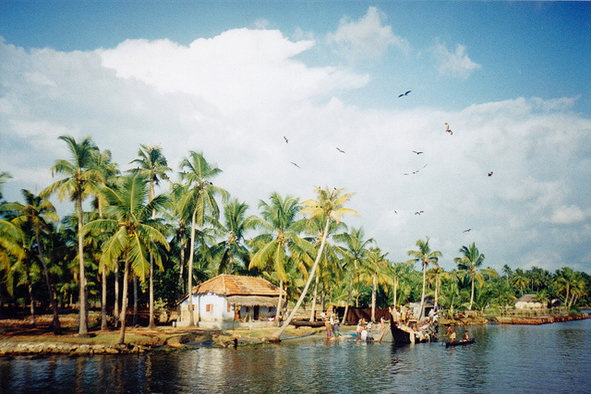The United Nations has declared 2017 the International Year of Sustainable Tourism for Development – and we’re jumping on the bandwagon. At TravelMag we relish the diversity of environments and cultures that the world has to offer, so have decided to make it our priority to appreciate them in a responsible way. Our New Year’s resolution is to present one ecological or responsible tourism initiative or destination to our readers each week. You can show your support, and find out about the best ways to travel harmlessly by following us at TravelMag.com.

Keralan Backwaters, India (Photo: Jo Kent via Flickr)
The Trouble with Tourism
At a time when over a billion people are travelling internationally each year, the global tourist industry is prosperous and constantly growing. The demand for exciting new travel destinations and activities is insatiable, encouraging more and more parts of the world to open up to visitors while building up the infrastructure and services needed to cater to international demand.
However, the economic growth that comes with tourism is not always harnessed for the development of communities at stake, often emerging at the expense of social and environmental welfare. The question then is how to reap the benefits of the profitable industry without sacrificing the landscape, cultures and heritage that make the destination so attractive in the first place?
It is important to be aware that the problem is not exclusive to ‘less-developed’ locations however. Tourist destinations in prosperous countries face challenges too, where the nature of unsustainable tourism is growing more and more apparent. Take Australia for example, where the withering away of the Great Barrier Reef illustrates how global warming and years of invasive, unsustainable tourism practices have caused a natural wonder to decay at an exceptional rate. With many businesses relying on the tourist industry to prosper, it’s no mean feat to figure out how to sustain them without sacrificing the world-famous reef.

The Great Barrier Reef, Australia (Photo: Steve Parish/Lock the Gate Alliance via Flickr)
2017: The United Nations Year of Sustainable Tourism for Development
Last September the international community took on the Sustainable Development Goals (SDGs) for 2015-2030. At least three of these goals apply to shortcomings apparent in the tourist industry: to ‘promote sustained, inclusive and sustainable economic growth, full and productive employment and decent work for all’ (SDG 8), ‘sustainable consumption and production’ (SDG 12) and to ‘conserve and sustainably use the oceans, seas and marine resources for sustainable development’ (SDG 14). Nonetheless, the UN considers the industry to have great potential to develop sustainably in years to come.
If the UN considers tourism a golden opportunity for positive change and development in 2017, it is partly because the industry affects so many people around the world today. According to the World Tourism Organisation (UNTWO), tourism accounts for 10% of the world’s GDP, 7% of global exports and one in eleven jobs. The UN believes that by improving how tourism is managed through better policies, business models, and the responsibilisation of service providers and travellers, the industry has the potential to lead the way to sustainable living for all industries.
Environmental safeguarding in the face of climate change is one of the most visible reasons for sustainable tourism. However, improving the industry goes above and beyond environmental practices and resource management, also demanding economic and social development. Sustainable tourism then is about developing a well-managed industry designed to drive economic growth while protecting natural resources, establishing stable jobs and livelihoods, facilitating social inclusiveness, fostering social development, cultural preservation and the promotion of mutual understanding and respect between cultures.
What does it mean for us?
For passionate and ethical travellers, this is the year to develop awareness of troublesome travel practices – which we no doubt have unwittingly engaged in in the past. Travelling sustainably can be approached in many ways today, be it through a traveller’s mind-set, a programme, or local initiatives in host communities. As these grow in reach and popularity, those involved in the tourism industry worldwide will be encouraged to develop sustainably.

Backpackers in Denali National Park and Preserve (Photo: NPS Photo/ Alex Vanderstuyf via Flickr)
There’s a lot of jargon associated with responsible travel, and differences in what sustainability means to various people. Ecotourism enthusiasts, for example, value travel to relatively undisturbed natural spaces with a culturally sensitive, unintrusive attitude. Travellers and initiatives in ecotourism take steps to minimise their impact on visited spaces and communities. Meanwhile they focus on making the industry inclusive by prioritising various practices, such as learning from locals for example. Green tourism on the other hand, recognises tourism services that are committed to environmental protection and green solutions for tourists.
Sustainable tourism is associated with low-carbon emission mobility as well as endeavouring to have positive social, environmental and ecological impacts on host communities and spaces when travelling. Broadening out from just ecological concerns, responsible tourism seeks to prioritise positive interaction between tourists and host communities, focusing on cultural respect as well as social and economic justice. There are countless certification schemes globally that reward destinations and industry players working with a responsible attitude – so why not look out for them when planning your next adventure?
Here to help
We’re fortunate enough to be travelling at a time when there are many initiatives and destinations that have made sustainable tourism their core objective. It’s becoming so easy to get on board with the cause. Over the coming months, we’ll be getting to know some of the most interesting and innovative cases of responsible tourism out there. So if you want to get a feel for it or tell us about a great initiative you’ve come across yourself, make sure you get involved on our Facebook page.